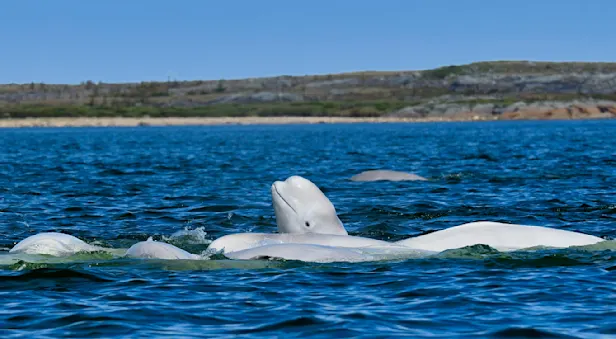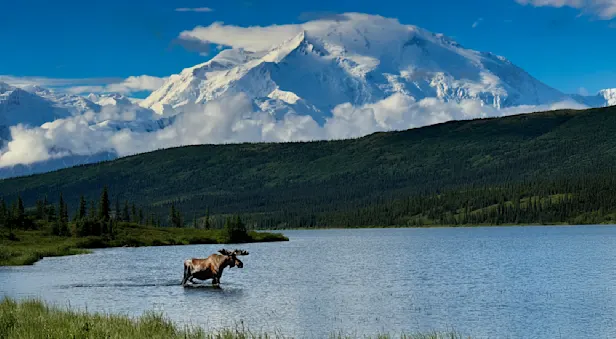
Know Before You Go
Caribou Facts | Churchill Summer Wildlife Guide
For eons, indigenous cultures have relied on the "deer of the North" for food and clothing. A wealth of caribou would bring celebrations and feasting, while a scarcity meant famine and hardship. An iconic symbol of the North, this social herd animal—equally comfortable in the boreal forest and on the open tundra—makes more extensive migrations and occurs in larger herd numbers than any other North American land mammal.
Though they often follow similar migration patterns and frequent the same seasonal ranges, caribou can be unpredictable and diverge from their traditional routes. During summer, however, they tend to head toward the coast where tidal flats offer a respite from the ubiquitous black flies of the interior.
Physical Characteristics
Both sexes of caribou have antlers, a fact that differentiates them from all other deer species. The shape of each animal’s antlers varies significantly, and many believe that no two pairs of antlers look the same. Adult bulls shed their large antlers early in winter, but cows retain theirs until June when calving time arrives. This way, pregnant females can claim and protect optimal feeding areas through the winter when getting food of the highest quality is imperative to nurturing their quickly developing fetuses.
Numerous critical adaptations enable caribou to endure, and even prosper, during long, frigid winters. The caribou maintains two different internal temperatures to avoid dangerous loss of heat from its lanky legs. While its core temperature stays near 105°F, its legs stay at least 50 degrees colder because the arteries and veins of the caribou run right next to each other, meaning that the out-flowing arterial blood transmits its warmth to the chilled, venous blood returning from the limbs. The blood vessels in the caribou’s extremities allow just enough blood to flow so they lose very little valuable body heat to the chilly, ambient air, and their legs do not succumb to frost damage.
The caribou’s coat, made of dense, hollow club-shaped hair, shields the animal, including its feet, tail and muzzle, from extreme temperatures. These hairs, which have thicker tips than bases, create a coat with a thin, curly underwool and a thickly packed outside layer that has countless small spaces of air. With this extremely warm coat, caribou become practically invincible to even the nastiest Arctic weather. Because of all the adaptations that have made caribou able to thrive in the Arctic, some scientists refer to them as chionophiles, or "snow lovers."
Giant feet that act as snowshoes allow caribou to stay on top of soft snow, another necessary adaptation for this environment. Their wide, sharp hooves also allow them to effortlessly break and clear snow when they dig craters in search of food.
Calving
The majority of caribou herds have been named after the remote locations of their calving grounds. Each spring, pregnant cows and their yearling fawns march to the areas of their birth, trekking 15 to 20 miles a day. They cross vast stretches of land, led by memories of past migrations. Cows rush determinedly towards their destination, while bulls lag behind at a leisurely pace.
After reaching the calving ground, the females scatter. The previous autumn, most breeding occurred all at once. Now, in mid-June, an astounding phenomenon takes place as most of the fawns are born within a five-day period. Within hours, newborns are able to stand and walk. Soon, they follow their mothers across the tundra. Synchronized birth has great advantages, as herds are able to rapidly regroup after calving. The caribou recognizes the dangers of straying behind—there is safety in numbers.
Calving at the same time has its benefits, but it also leaves newborn fawns vulnerable. If a blizzard were to strike at any point during the crucial five days of birthing, or if freezing rain douses the fawns’ insulated fur, the calves can face death. In years of strife, fawns make up less than five percent of the herd, while in good years, they constitute up to 25 percent.
Predation
Wolves and humans are the caribou’s primary predators. Wolves are skillful hunters, strategically working in teams to chase down or ambush their prey. They are more than capable of taking down a healthy caribou, but prefer easier targets such as calves, strays and those in a weakened state due to sickness or old age.
See Caribou on These Northern Adventures

Churchill’s Belugas, Polar Bears & Arctic Wildlife
Meet hundreds of friendly beluga whales up close via Zodiac and kayak, and look for caribou, polar bears, Arctic fox and more on this exhilarating summer adventure in the Canadian subarctic.































